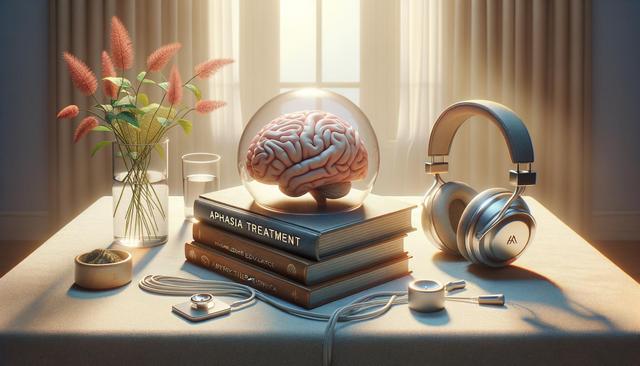Understanding Aphasia Symptoms and Causes
Aphasia is a language disorder typically caused by damage to the brain’s language centers, often due to stroke, traumatic brain injury, or neurological illnesses. It affects a person’s ability to speak, understand, read, or write, and symptoms can vary widely depending on the location and severity of the brain damage. Recognizing these symptoms early is crucial for effective intervention. Common indicators include difficulty finding words, speaking in short or incomplete sentences, and trouble understanding spoken or written language. Understanding aphasia symptoms not only helps in early detection but also guides the selection of suitable aphasia treatment options.
There are several types of aphasia, including:
- Broca’s Aphasia – characterized by broken speech but relatively good understanding
- Wernicke’s Aphasia – fluent speech that may lack meaning with poor comprehension
- Global Aphasia – severe impairment in both expression and comprehension
Identifying the type of aphasia is an important step in tailoring individual recovery plans and communication strategies.
Speech Therapy for Aphasia: A Cornerstone of Recovery
Speech therapy for aphasia is one of the most widely used and effective approaches to help individuals regain communication skills. Therapy sessions are typically led by speech-language pathologists who assess the individual’s language abilities and design targeted interventions. These sessions focus on exercises that rebuild language function by stimulating neural pathways responsible for communication.
Some common therapeutic techniques include:
- Language drills to improve word retrieval
- Conversational practice to enhance verbal expression
- Comprehension activities using written or spoken cues
- Augmentative and alternative communication (AAC) tools for severe cases
Therapy can be delivered in individual or group settings, and the choice often depends on the person’s specific goals and level of impairment. With consistent practice and professional guidance, many individuals observe meaningful improvements in their ability to communicate effectively.
Communication Exercises for Aphasia at Home
In addition to formal therapy, communication exercises for aphasia practiced at home can significantly support the recovery process. These exercises are designed to be engaging and manageable, helping individuals reinforce strategies learned during professional sessions. Home practice also encourages involvement from family members and caregivers, fostering a supportive communication environment.
Examples of at-home exercises include:
- Labeling household items to practice word recall
- Using flashcards for matching words with images
- Reading aloud and discussing short stories or news articles
- Playing word games or using language apps tailored for aphasia
Consistency is key when practicing these exercises. It’s important to build a routine that includes short, frequent sessions to maintain progress. Caregivers can support by providing encouragement, offering feedback, and celebrating small victories along the way.
Support for Language Disorders: Building a Strong Network
Living with aphasia can be isolating, but having access to strong support for language disorders can make a significant difference in emotional well-being and recovery outcomes. Support networks may include healthcare professionals, family, friends, and community groups. These networks provide not only emotional encouragement but also practical assistance with daily communication tasks.
Support resources can include:
- Local aphasia support groups offering peer interaction and shared experiences
- Online forums and virtual communities for broader connection
- Counseling services to address emotional and psychological challenges
- Educational workshops for caregivers and loved ones
Encouraging participation in social activities and group discussions can help boost confidence and reduce feelings of isolation. A strong support system also promotes accountability and motivation throughout the rehabilitation journey.
Aphasia Recovery Programs and Long-Term Management
Aphasia recovery programs are structured plans that combine various interventions such as speech therapy, occupational therapy, and cognitive exercises. These programs are often hosted by rehabilitation centers or outpatient clinics and are designed to provide comprehensive care through collaborative teams. The goal is to address not just language deficits, but also related cognitive and emotional challenges to improve overall quality of life.
Key elements of effective recovery programs include:
- Customized treatment plans based on individual assessments
- Interdisciplinary collaboration among healthcare providers
- Regular progress evaluations and plan adjustments
- Patient and caregiver education on how to manage aphasia
Learning how to manage aphasia in everyday life involves adapting communication strategies, using assistive tools, and setting realistic goals. While full recovery may not always be possible, many individuals experience significant gains that enhance independence and social engagement. Ongoing participation in recovery programs can lead to sustained improvement and better coping mechanisms over time.
Conclusion: Supporting Progress Through Knowledge and Commitment
For those navigating the challenges of aphasia, awareness and access to effective strategies are essential. From understanding aphasia symptoms to engaging in communication exercises for aphasia, each step contributes to a more empowered recovery journey. Speech therapy for aphasia, combined with home-based practice and a robust support network, lays the foundation for meaningful progress. Participating in aphasia recovery programs and learning how to manage aphasia over time can significantly enhance communication abilities and quality of life. With ongoing effort, encouragement, and the right resources, individuals with aphasia can build confidence and reconnect with the world around them.




Leave a Reply